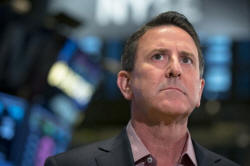|
Exclusive: Retail CEOs to
meet Trump in bid to kill U.S. border tax
 Send a link to a friend
Send a link to a friend
 [February 15, 2017]
By Ginger Gibson [February 15, 2017]
By Ginger Gibson
WASHINGTON
(Reuters) - U.S. President Donald Trump will meet on Wednesday with the
chief executives of eight large retailers, including Target Corp, Best
Buy Co Inc and J.C. Penney Company Inc, to discuss tax reform and
infrastructure improvements, according to people with knowledge of the
meeting.
A White House official confirmed Trump will meet with retail industry
CEOs on Wednesday morning to discuss economic growth.
The meeting will include Target CEO Brian Cornell, Best Buy CEO Hubert
Joly, Gap Inc CEO Art Peck, Autozone Inc CEO William Rhodes, Walgreens
Boots Alliance Inc CEO Stefano Pessina, J.C. Penney Company Inc
CEO Marvin Ellison, Jo-Ann Stores LLC [NEDLEJ.UL] CEO Jill Soltau and
Tractor Supply Co CEO Gregory Sandfort, according to the people familiar
with the matter.
This is the first time well-known retail CEOs will descend on Washington
as a group to try to make the case that a controversial proposal to tax
all imports will raise consumer prices and hurt their businesses.

Their input has more urgency as Trump is finalizing his own tax plan
that he plans to unveil in the coming weeks.
The group will also meet on Wednesday with the heads of the two
tax-writing Congressional committees -- Kevin Brady, chairman of the
House Ways and Means Committee, and Senator Orrin Hatch, chairman of the
Senate Finance Committee, Reuters reported on Monday.
Brady and Speaker Paul Ryan are leading a House Republican push that
would cut corporate income tax to 20 percent from 35 percent, exclude
export revenue from taxable income and impose a 20 percent tax on
imports. Companies that rely heavily on imports, such as retailers,
automakers and refiners say a border tax will outweigh the benefit of a
lower headline corporate tax.
"Given the retail industry's position as America's largest
private-sector employer, retailers welcome the opportunity to speak with
President Trump about policies that will spur job creation and economic
growth here in the United States,” said Brian Dodge, a spokesman for the
Retail Industry Leaders Association.
The trade group is leading the industry's effort to oppose House
Republicans' proposal for a border adjustability tax, running a
coalition of more than 120 companies and trade organizations including
Wal-Mart Stores Inc.
[to top of second column] |

Target Corp. CEO, Brian Cornell speaks during an interview on the
floor of the New York Stock Exchange November 28, 2014.
REUTERS/Brendan McDermid

Representatives for all eight retailers headed to Washington did not respond to
requests for comment.
Trump has voiced some concern about the House tax proposal calling it "too
complicated." But the White House also said previously that a border tax on
goods from Mexico is one option under review to pay for a wall along the
nation's southern border.
The
prospect of a big import tax is also pitting some of the largest U.S. companies
against one another. A group of major exporters including Boeing Co, General
Electric Co <GE.N> and Pfizer Inc have formed their own coalition to support the
import tax.
Retailers have become the most vocal opponents to the proposal, saying a 20
percent tax on imported goods would cause prices to increase for consumers and
erase any profits the companies currently make. Nearly all of the nation's
clothing, shoes and electronics are imported into the United States, as well as
foods that cannot be grown domestically, like coffee and palm oil.
The largest U.S. electronics retailer, Best Buy, for example, has circulated a
flyer to lawmakers, which cites an analyst forecast that a 20 percent tax would
wipe out the company's projected annual net income of $1 billion and turn it
into a $2 billion loss.
(Reporting by Ginger Gibson in Washington, Additional reporting by David
Shepardson and Steve Holland; Editing by Soyoung Kim and Lisa Shumaker)
[© 2017 Thomson Reuters. All rights
reserved.] Copyright 2017 Reuters. All rights reserved. This material may not be published,
broadcast, rewritten or redistributed.
 |